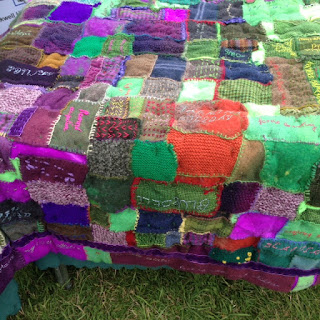It's lovely when two projects come together and Stitching the Wars and The Homeless Library were bound to feed into each other at some point- the Homeless Library was part inspired by the late greatly missed Wilf who I met at Bakewell Age UK, who shared memories of unemployed men sleeping in the ditches between the wars and the tramps walking from Bakewell Workhouse to Chapel en le Frith. During an afternoon spent with the Social Group at The Farming Life Centre, it turns out that 'tramps' where a regular sight in the countryside in the 30s and beyond.
 |
| Tom and Bill, (Bill, sorely missed) Social Group, Farming Life Centre |
"Tramps after the war, you’d see one most
days, they used to go to the local workhouse. Walk from one workhouse to
another, a distance they could walk in a day. They put signs on posts to say
who would look after you. They lived off their wits, they would beg a crust,
lost souls
Asleep in the hedgerows
I used to take a dog with me and send him
in first to check the barn, once saw a wellie sticking out of the hay barn
The hay barn near Ashford always had tramps
in it.
Worried about setting fire to the barn over
night from their smoking
Just passing through
Workhouses in New Mills, Babington in Belper,
Bakewell and Buxton, they would break stone in the night
We would offer a crust and a cup of tea,
there were markers to where you were welcome
Turnip picking, mother would produce a
plate of food that was taken to the barn.
Had they had a life? Didn't they like that
life? Drop out from a wealthy family?
One drew marvellous pictures.
There was a lady who lived in a tent all
winter in the 40’s bottom of Sheldon Dale, in a make shift tent all winter
One came round with a pram and a gramophone,
he had a big white beard, a chubby red faced man.
They used to come round sharpening scissors
and knifes
You'd see a tramp every day when you were
going feeding. They got a lot of help in the village.
Tramps, some ex soldiers from the 14-18 War
I’m trying to work out where they
intelligent people who dropped out or the very poor? Black Harry in Baslow, in
a cave up Chesterfield Road
Tramps would scare you to death, but they’d
be more scared of you that the other way round."
 |
| Graham |
Thanks to everyone at The Social Group at The Farming Life Centre, Derbyshire, and Helen for her marvellous note taking. I'd love to have met the chubby guy with the long white beard and jolly face, he sounds kind of familiar...







